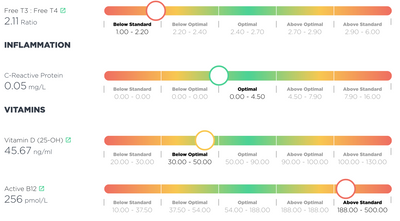
Vegan Diets – Practical Advice For Avoiding Nutritional Deficiencies
Overview
Studies repeatedly confirmed the wholesome benefits of following a plant-based diet, such as the vegan diet. This lifestyle is almost synonymous with being fit and healthy.
However, there are still some potential risks to take into consideration. For instance, vegans are more likely to develop nutritional deficiencies due to the restrictive nature of their diet.
In this article, we will cover several tips to help you avoid these deficiencies while on a vegan diet. We will also touch on some key nutrients that you need to consider.
Vegan diet and nutritional deficiencies
The concept of dieting and nutritional deficiencies is not exclusive to the vegan diet. Any eating style that eliminates whole food groups will predispose you to the lack of certain nutrients. In the case of the vegan diet, animal products are a rich source of some nutrients that are relatively challenging to obtain from a plant-based diet.
For instance, vitamin B12 is abundant in animal products, which is vital for preventing anemia and blood cell disorders.
Moreover, researchers found that vegans are more likely to deal with low levels of protein, zinc, and selenium.
With all of that said, consuming fortified foods and supplements can be an effective way to combat these deficiencies. However, if you have any concurrent medical conditions, speak with your doctor before taking any supplements.
In the next sections, we will cover the most common vegan deficiencies and how to recover from them.
Deficient nutrients when on the vegan diet
Beta-alanine
Beta-alanine is a non-essential amino acid that produces carnosine when combined with histidine. The purpose of carnosine is to prevent the buildup of lactic acid during physical activity.
When we mentioned that beta-alanine is a non-essential amino acid, it means that the body can produce it intrinsically. However, researchers found that women, vegetarians, and vegans are particularly susceptible to carnosine deficiency. This predisposition increases dramatically with age.
The easiest way to supply yourself with beta-alanine is by taking supplements.
Creatine
While your body may be able to produce decent amounts of creatine, many individuals could benefit further from supplementation. In fact, creatine supplements are routinely taken in different gyms and workout centers.
This naturally occurring amino acid is mainly found in seafood, poultry, and red meat. As a result, vegans and vegetarians tend to have lower stores of creatine in their muscles.
Research highlights that supplying vegans with creatine lead to benefits due to the borderline deficiency in these individuals.
In one study, scientists concluded that creatine supplements increase the low stores of this amino acid in vegans and vegetarians, which leads to:
- Optimised use of fatty acids for energy production
- Increased physical strength during workouts
- Increased lean tissue (muscle) gains
Vitamin B12
Generally speaking, unwashed organic produce (e.g., nori, spirulina, chlorella, mushrooms grown in B12-rich soils, nutritional yeast) contains vitamin B12.
Some vegans think that eating these foods should be enough to prevent vitamin B12 deficiency. In reality, this is not true.
One reason for that might be that plant-based foods that contain natural vitamin B12 may not be active in humans.
Furthermore, there is no evidence that recommends consuming unwashed organic produce to supply yourself with vitamin B12.
According to studies, vegetarians and vegans are at risk of vitamin B12 deficiency compared to people who follow a standard diet.
If you are a vegan, the best way to get your supply of vitamin B12 is through supplementation. It is an easy, quick, and effective process.
Vitamin D
As the winter season approaches, you are less likely to get exposed to the sun. In western countries, this process increases the risk of vitamin D deficiency.
Adding the argument, vegans are at a higher risk of this problem due to restricted dietary choices. For instance, eggs are a great source of vitamin D. Excluding this food from your diet increases your risk if not compensated with other methods.
Unfortunately, the incidence of seasonal affective disorder (SAD) is significantly higher during this time of the year, which indicates a link between this condition and vitamin D deficiency.
Researchers estimate that you need around 10–30 minutes of daily sunlight exposure to get your supply of vitamin D.
Note that wearing sunblock prevents the production of vitamin D.
If you cannot get vitamin D from sunlight exposure or food, it is time for supplements.
Iodine
Iodine is a mineral that’s commonly found in shellfish and fish. You can also find it in grains and cereals.
This mineral is indispensable for the production of thyroid hormones. Therefore, any deficiency in iodine can lead to hypothyroidism. More specifically, the thyroid disorder associated with iodine deficiency is known as goiter, which is incredibly prevalent in certain areas of the world.
Since vegans exclude seafood from their diets, there is a risk of developing iodine deficiency. Fortunately, governments around the world made the effort to fortify many foods with this mineral.
Currently, guidelines state that an adult should get at least 140 micrograms of iodine per day. Despite how negligible this amount may seem, it is vital for the synthesis of thyroid hormones.
To prevent iodine deficiency, learn about the foods in your area that are fortified with this mineral.
If you are still concerned, speak with your doctor about this issue. He/she may order some blood tests to check for iodine and thyroid hormone levels and correct any abnormalities.
Takeaway message
Learning about the potential deficiencies of the vegan diet and taking the necessary steps to prevent them is indispensable for a healthy, disease-free life.
We hope that this article managed to shed some light on the key nutrients that could pose a problem for vegans and the ways to replenish your stores.

